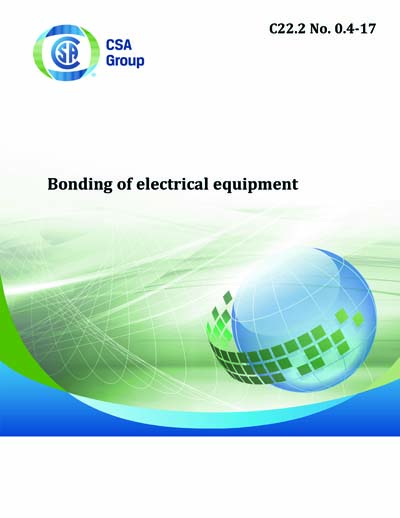Historical
CSA C22.2 No. 0.4-2017
C22.2 NO. 0.4-17 - Bonding of electrical equipment
Preface
This is the fourth edition of CSA C22.2 No. 0.4, Bonding of electrical equipment, one of a series of Standards issued by CSA Group under Part II of the Canadian Electrical Code. It supersedes the previous editions published in 2004, 1982, and 1972. The major changes in this edition are as follows: a) the addition of an informative annex showing possible techniques for bonding; b) a definition of Exposed, since the usage in this Standard is different from that in the Canadian Electrical Code, Part I; c) clarification of which symbol to use for bonding; d) allowing the option of DC testing for DC only products; and e) reorganizations according to current editorial practice.Scope
1.1 This Standard applies to electrical equipment that is intended for installation and use in accordance with the requirements of Part I of the Canadian Electrical Code (CE Code) and is a) cord connected or permanently connected and required to be bonded by either Part I or Part II of the CE Code; or b) constructed in a manner intended to ensure that it can be bonded when installed. Note: The bonding specified in this Clause does not include bonding that is applied to equipment solely for a purpose such as protection from lightning discharge or preventing electrical noise from interfering with the functioning of communications and computer circuits. 1.2 This Standard includes provisions for certain details of construction and for testing procedures by which a certification body may determine compliance with the applicable Standard. 1.3 This Standard does not include the evaluation of bonding path provisions for equipment used as wiring methods in accordance with Section 12 of the CE Code. Note: Short-time-current test requirements for equipment used as a bonding path are found in CSA C22.2 No. 41 Grounding and bonding equipment. 1.4 In this Standard, shall is used to express a requirement, i.e., a provision that the user is obliged to satisfy in order to comply with the standard; should is used to express a recommendation or that which is advised but not required; and may is used to express an option or that which is permissible within the limits of the Standard. Notes accompanying clauses do not include requirements or alternative requirements; the purpose of a note accompanying a clause is to separate from the text explanatory or informative material. Notes to tables and figures are considered part of the table or figure and may be written as requirements. Annexes are designated normative (mandatory) or informative (non-mandatory) to define their application.Content Provider
CSA America, Inc. [csa]






